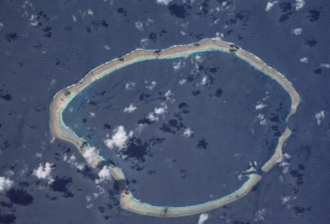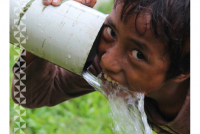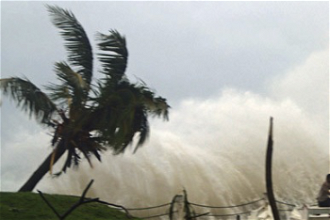Caritas urges more support for islanders threatened by rising sea levels

NASA image of Cartaret Islands
Many island communities are suffering the impact of rising sea levels and more unstable weather patterns due to global warming - but a new report from Caritas Aotearoa New Zealand, shows that funding to help the most vulnerable Oceania communities adapt to climate change is 'woefully inadequate' and simply not getting to those who need it most.
Released this month, Caritas' State of the Environment Report for Oceania - Caring for our Common Home draws on information provided through working with grassroots communities across Oceania on development, humanitarian relief, advocacy and education projects.
One example highlighted by Caritas director Julianne Hickey is that of Carteret Island communities that are having to relocate themselves from their disappearing homeland to Bougainville with virtually no assistance from government climate financing.
"The Carteret Islanders are largely depending on their own tenacity and ingenuity, the support of the Catholic church, and some direct funding," said Mrs Hickey.
"There are around 40 families still on the Islands that are waiting to move to the mainland - where there is land available for them - but there is no money to build houses. Overall, our assessment is that funding for countries in desperate need of assistance with adaptation and mitigation are only receiving about 10 per cent of what's needed."
This raises serious questions about examples highlighted in the report of building a new jetty in the Cook Islands or rehabilitating runways in Solomon Islands as part of 'climate adaptation' funding from the New Zealand Government.
The conclusion from the report is that only half of New Zealand's climate aid dollars over the last three years have been spent on necessary adaptation projects. The other half has been spent on repairing damage caused by severe weather emergencies, or supporting 'business-as-usual' infrastructure projects and economic development of fisheries, forestry and tourism. There is little indication such projects are targeting the poorest and most vulnerable in the Pacific.
Caritas has however said it is encouraged by the New Zealand Government's support of renewable energy projects for Pacific Island nations. Significant and meaningful carbon emission cuts at home are also needed, in addition to a much stronger climate commitment to the United Nations climate conference in Paris this December (COP21).
Mrs Hickey will present key findings and recommendations from the State of the Environment report to the conference as part of an international Caritas delegation.
* The Carteret Islands (also known as Carteret Atoll, Tulun or Kilinailau Islands/Atoll) are Papua New Guinea islands located 86 km (53 mi) north-east of Bougainville in the South Pacific. The atoll has a scattering of low-lying islands called Han, Jangain, Yesila, Yolasa and Piul, in a horseshoe shape stretching 30 km (19 mi) in north-south direction, with a total land area of 0.6 square kilometres (0.2 sq mi) and a maximum elevation of 1.5 metres (4 ft 11.1 in) above sea level.
In 2007, CNN reported that the Carteret islanders may be the first island community in the world to undergo an organized relocation, in response to rising sea levels. The people of the Carteret are being called the world's first environmental refugees.
Source: Caritas Aotearoa New Zealand/ICN


















